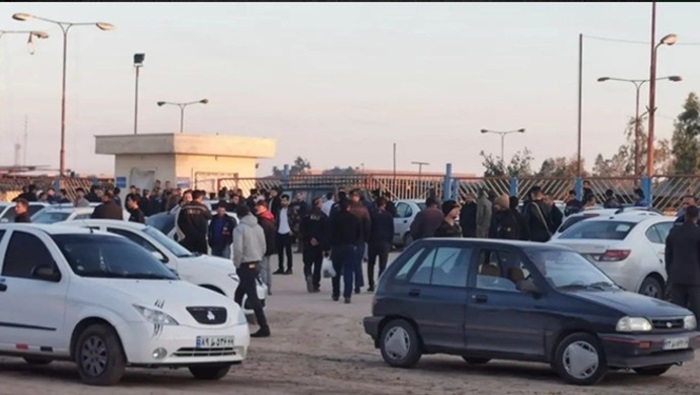
In a fervent wave of strikes and protests, employees of the Iran National Steel Industrial Group in Ahvaz are steadfast in their pursuit of improved working conditions.
The third day of the ongoing strike saw resolute demonstrators chanting, “Workers will die but won’t live in disgrace,” underscoring their rejection of the challenging circumstances they face.
These protests are rooted in a series of strikes that commenced on February 13 when workers were arbitrarily prevented from entering the factory, reflecting a stark conflict between the workers’ demands and the management, owned by Bank Melli. The workers’ appeals encompass a change in ownership, a comprehensive review of the job classification plan, addressing its shortcomings, and aligning wages with those in similar steel companies. In January, a week-long strike was organized to emphasize these demands.
Simultaneously, protesters denounce the “enslavement” of workers by regional, banking, and corporate authorities in Khuzestan province. The management’s perceived reluctance to respond to their demands is deemed “insulting.”A report by the state-run Mehr News Agency acknowledges that wage levels in Iran are significantly lower than global standards. Iranian workers earn approximately 160 to 170 dollars per month for 192 hours of work, in stark contrast to the 23 to 26 euros per hour earned in European and American countries.
راهپیمایی اعتراضی #کارگران گروه ملی صنعتی فولاد #اهواز
همشهری به هوش باش ماکارگریم نه اوباش
یکشنبه ۸ بهمن ۱۴۰۲ pic.twitter.com/oRFeFRT8RQ— fereshteh (@fereshteh531) January 28, 2024
These protests occur against the backdrop of a rising number of labor and trade union protests in Iran, spanning issues such as delayed wage payments, privatization, layoffs, non-implementation of the job classification plan, and low wages.
These demonstrations and strikes embody the workers’ outcry against exploitation and the absence of social justice, as they strive for a dignified life commensurate with their hard work and efforts.
Concurrently, various sectors of Iranian society are mobilizing in protest of economic hardships. Pensioners, retired government employees, retirees from steel and telecommunications industries, state-backed creditors, nurses, and farmers are all voicing discontent over their living conditions and meager wages.
راهپیمائی اعتراضی #کارگران گروه ملی فولاد در مرکز شهر #اهواز
یکشنبه ۸ بهمن ۱۴۰۲ pic.twitter.com/i0jMRQEorJ— بگونه (@begoonah1) January 28, 2024
Recent leaks revealing astronomical wages for Majlis officials, 40 times higher than those of teachers or government employees, underscore rampant corruption in the government. These issues, coupled with social injustice and repressive policies, set the stage for a potential nationwide uprising.

MEK Iran (follow us on Twitter and Facebook), Maryam Rajavi’s on her site, Twitter & Facebook, NCRI (Twitter & Facebook), and People’s Mojahedin Organization of Iran – MEK IRAN – YouTu
